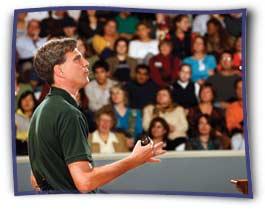 nly about 400 people were there to hear Randy Pausch give his “last lecture” in September 2007 in an auditorium at Carnegie Mellon University (CMU). Since then, more than 10 million people have downloaded his message off the Internet. Millions more have watched his interviews with Oprah Winfrey and Diane Sawyer. And The Wall Street Journal’s Jeffrey Zaslow has collaborated with Pausch on a recently released book titled The Last Lecture.
nly about 400 people were there to hear Randy Pausch give his “last lecture” in September 2007 in an auditorium at Carnegie Mellon University (CMU). Since then, more than 10 million people have downloaded his message off the Internet. Millions more have watched his interviews with Oprah Winfrey and Diane Sawyer. And The Wall Street Journal’s Jeffrey Zaslow has collaborated with Pausch on a recently released book titled The Last Lecture.
So what did he say that was so profound?
According to Sonja Barisic of The Associated Press, the message was simple—“Have fun, tell the truth, dare to take risks, look for the best in everyone, make time for what matters, and always be prepared.”1
Zaslow attempted to explain the reaction to Pausch’s lecture when he wrote: “It was as if Randy had touched the yearning in all of us to have a wise lecturer spell out, very simply, the complete meaning of life. Of course, Randy didn’t do that. Who could? . . . [But] he had given it an absolutely heroic try.”2
 Pausch, a 47-year-old computer science professor at CMU and the father of three young children, was diagnosed with pancreatic cancer in September 2006. Last August he was told the cancer had spread and he was given only months to live.
Pausch, a 47-year-old computer science professor at CMU and the father of three young children, was diagnosed with pancreatic cancer in September 2006. Last August he was told the cancer had spread and he was given only months to live.
So as the speaker of the annual lecture series called “The Last Lecture,” when Pausch addressed the hypothetical question—What would you say if you knew you were going to die and had a chance to sum up everything that was most important to you?—the response was real.
But Pausch spoke only with optimism and humor.
“The lecture wasn’t about dying; it’s about living,” he says.
For example, referencing a computer application teaching program called Alice, which he and others created collaboratively, his enthusiasm for life and his intense desire to help his students achieve success came through clearly. “I, like Moses, get to see the Promised Land, but I won’t get to set foot in it, and that’s OK,” he said, “because I can see it, and the vision is clear—millions of kids having fun while learning something hard. That’s pretty cool. I can deal with that as a legacy.”
Pausch also gave a positive twist on encountering seemingly insurmountable obstacles, which he called brick walls.
“The brick walls are there for a reason,” he said. “The brick walls are not there to keep us out. The brick walls are there to give us a chance to show how badly we want something.”
Although I can resonate with much of what Pausch said, if I were giving a last lecture I believe I would focus on what Pausch said he wasn’t going to address—“the spiritual and the religious.” But many didn’t miss this omission. A recent ABC News article sums up the astounding effect of his lecture this way: “Somehow amid the vast clamor of the Web and the bling-bling of million-dollar budgets, savvy marketing campaigns, and millions of strange and bizarre videos, the voice of one earnest professor standing at a podium and talking about his childhood dreams cut through the noise.”3
Cutting through the noise. Isn’t that what we Adventist Christians are trying to do?
Perhaps we can learn something from Randy Pausch about how to do that. Perhaps the answers to some of life’s burning questions aren’t necessarily found in academic textbooks, scholarly lectures, and doctrinal debates—as important as these are. Maybe the answers are sometimes much simpler than that.
Solomon, commonly described as the wisest man in the Bible, summed up the responsibilities of those who love God: “Fear God and keep his commandments, for this is the whole duty of man” (Eccl. 12:13). He referred to this as “the conclusion of the matter.” Simple, brief, direct—and easy to remember.
Ellen White also advocates simplicity: “There is much missionary work to be done,” she writes. “But I have been shown that there is danger of having this work too mechanical, so intricate and complicated that less will be accomplished than if it were more simple, direct, plain, and decided.”4
When sharing the gospel message I’m not saying “simple” is good and “complex” is bad. Just sometimes, perhaps, it’s better.
_________
4Testimonies for the Church, vol. 4, pp. 600, 601__________________
Sandra Blackmer is an assistant editor of the Adventist Review.

 Pausch, a 47-year-old computer science professor at CMU and the father of three young children, was diagnosed with pancreatic cancer in September 2006. Last August he was told the cancer had spread and he was given only months to live.
Pausch, a 47-year-old computer science professor at CMU and the father of three young children, was diagnosed with pancreatic cancer in September 2006. Last August he was told the cancer had spread and he was given only months to live.